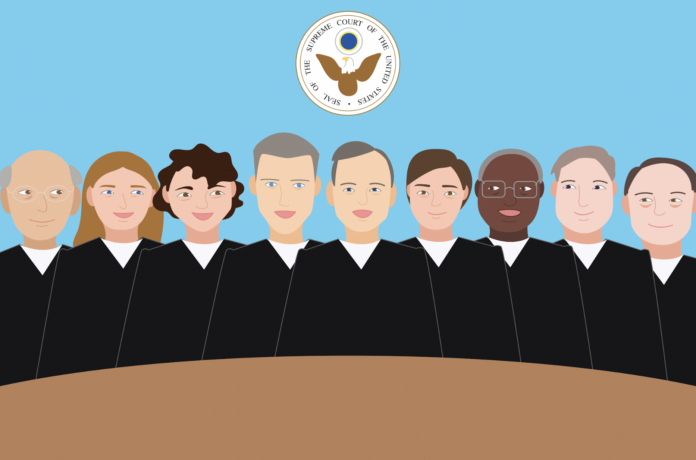The Supreme Court majority does not value your basic human rights
By CALEB SILVER — chsilver@ucdavis.edu
The ruling of Wardlow versus Illinois (2000), put succinctly, is evil and has a malicious lack of foresight. Sam Wardlow was walking in what was pre-conceived by police officers as an area in Chicago with higher crime rates than average. He saw a police van and then fled. The officers pursued Wardlow, detained him and found an illegal firearm on his person.
This case went to the Supreme Court, because Wardlow argued that the actions against him were in violation of his Fourth Amendment right, which protects an individual from unlawful search and seizure. The majority argued that, though running away from police is not enough to permit reasonable suspicion — which is what is needed to detain and search a civilian without a warrant according to the Fourth Amendment — doing so in a high crime area is.
Essentially, the Supreme Court of the United States (SCOTUS) made it known that civil liberties vary depending on the location. In this particular case, there is no substantial evidence that Wardlow was running because of the police. Could there have been someone behind the police van? Was he running away simply because this was, as labelled by the police, a “dangerous” area? Does he not have the right to do so? Or, if you don’t wish to humor me, is it not okay for Wardlow to just run from the police for no reason whatsoever? The police can be pretty terrifying, especially when they are present in these so-called dangerous areas (case in point).
This 25-year-old case is not an outlier. In fact, it’s probably somewhat sane considering the makeup of the current Supreme Court. Since 2020, SCOTUS has had six Republican-appointed justices, leading the court with a majority over the three Democratic nominees. The six include “thinkers” like Clarence Thomas, who “failed to disclose years of lavish trips from wealthy conservatives,” according to MSNBC News.
Corruption is actually a core tenet to this SCOTUS jurisprudence, as demonstrated by their ruling in Snyder versus United States. In this case, the majority, written by Chief Justice John Roberts, claims that a gratuity (which is essentially a bribe given as a sort of unofficial “gift” after the fact) given to a government official is, apparently, allowed — despite 18 U.S. Code § 666 specifically prohibiting such gifts or bribes if they exceed $5,000. For context, James Snyder accepted a $13,000 gratuity from a company for giving them a city contract, and he was found guilty in a jury trial. Snyder then appealed his case until it rose to the Supreme Court, which is currently full of judges who accept gratuities like it’s a part of their job.
This is not to mention Grants Pass versus Johnson, a case that decreed that the Eighth Amendment outlawing cruel and unusual punishment does not apply to banning unhoused people from sleeping outside; I should not have to describe why that one is wrong. Banning people who don’t have a house for not sleeping in a house is the definition of cruel and unusual. There is no reason why this shouldn’t fall under the Eighth Amendment, besides the fact that many conservatives do not care about unhoused people and believe punishing them is an effective way to end homelessness.
The jurisprudence of the Roberts Court seems to not be defined by any actual legal, logical or progressive decision-making. Similar to the decision made in the Wardlow case, they seem to work backward from preconceived political ties. The court consists of judges who have strict right-wing partisan ties and practice bizarre forms of textualism and constitutionalism — trying to twist the facts of the case to appease their billionaire buddies and keep steadfast preconceived ideologies. This is how the Supreme Court was designed to operate, and unless we have justice reform, this will continue to strip us of our civil liberties and erode our country’s democratic systems.
Written by: Caleb Silver — chsilver@ucdavis.edu
Disclaimer: The views and opinions expressed by individual columnists belong to the columnists alone and do not necessarily indicate the views and opinions held by The California Aggie.








